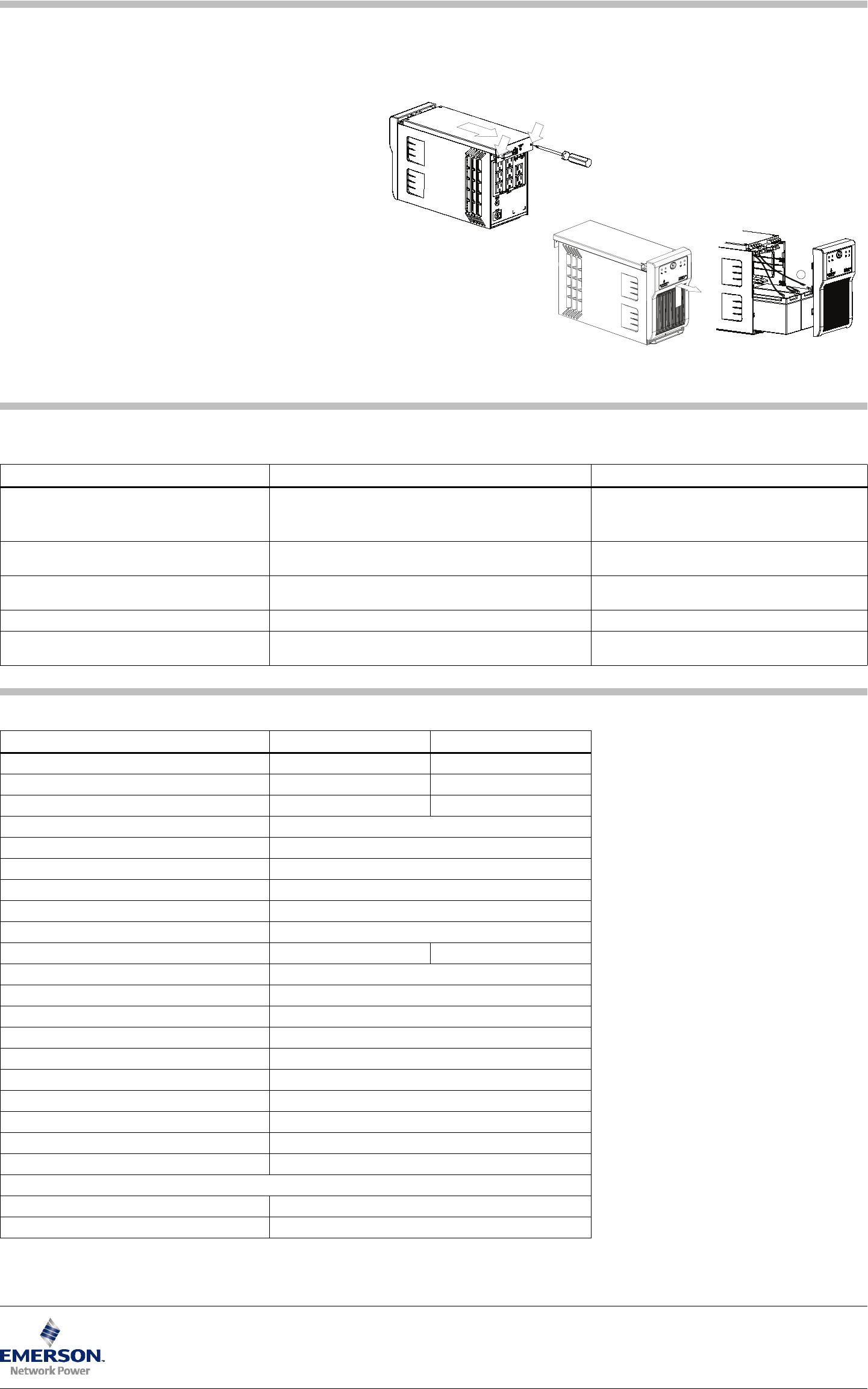
© 2008 Liebert Corporation
All rights reserved throughout the world. Specifications subject to change without notice.
® Liebert is a registered trademark of Liebert Corporation.
All names referred to are trademarks or registered trademarks of their respective owners.
SL-23301_REV0_04-08
Technical Support / Service United States
800-222-5877 (Outside U.S. 614-841-6755)
upstech@emersonnetworkpower.com
Web site: www.liebert.com
1050 Dearborn Drive
P.O. Box 29186
Columbus, OH 43229
REPLACING THE BATTERY
To replace the battery:
1. Turn off all connected loads, then turn off the UPS (batteries are NOT
hot-swappable).
2. Use a Phillips head screwdriver to remove the two top cover screws from
the back of the UPS.
3. Slide the top panel backward 1/2" (13mm). Slide the front panel upward,
then pull outward to remove it.
4. Gently pull the batteries out of the UPS.
5. Remove the black wire from the negative (-) terminal and the red wire from
the positive (+) terminal.
6. Verify that the replacement battery matches the dimensions and battery
type in the Specifications section below.
7. Connect the battery leads to the new batteries. Be sure to reconnect the
red wire to the positive (+) terminal and the black wire to the negative (-)
terminal.
Note: Small sparks may occur at the battery connectors during
reconnection.
8. Slide the batteries into the UPS.
9. Reposition the front panel and slide downward until it slides into place.
Slide the top panel forward until flush with the front panel. Reinsert the two
top cover screws removed in Step 2.
Dispose of the old batteries properly at an appropriate recycling facility.
TROUBLESHOOTING
If the UPS malfunctions during operation, check the following chart for proper adjustment. For further assistance, please contact your local Emerson Network Power representative.
SPECIFICATIONS
Problem Possible Causes Solutions
Utility power is normal, but LED 1 is not illuminated.
The UPS may not be turned on.
The power cord may not be connected properly.
The upstream input circuit breaker may be tripped.
• Press the On/Off button to turn on the UPS.
• Connect the power cord securely into a wall outlet.
• Reset the input circuit breaker.
LED 2 flashes (amber) every 3 seconds, but there is
no output power.
Battery voltage may be too low. • Recharge the UPS for 8 hours.
Alarm buzzer beeps continuously although utility
power is normal.
The UPS may be overloaded (check LED 2). • Disconnect some equipment from the UPS.
UPS does not provide expected backup time. The UPS battery reached end of life. • Replace the internal battery.
The UPS is on and connected to input power, but fails
to operate properly.
Utility power may be outside the unit’s operating range.
• If utility power is normal, try reconnecting input
power and restarting the UPS.
Model Number PSA1000MT3-120U PSA1500MT3-120U
Capacity (VA/W) 1000/600 1500/900
Net Weight, lb. (kg) 23.8 (10.8) 27.8 (12.6)
Shipping Weight, lb. (kg) 26.0 (11.8) 30.0 (13.6)
Dimensions - W x D x H, in. (mm) 5.8 x 14.2 x 9.2 (147 x 360 x 234)
On-Line Input Voltage 84-140VAC
On-Line Frequency 50/60Hz ±5Hz
Output Voltage (Mains Normal) Typical 97-129VAC
Output Voltage (Battery Operation) 120VAC ±5%
On-Battery Wave Form Stepped sinewave
Battery Type - VDC x Ah x Quantity 12V x 7Ah x 2 12V x 9Ah x 2
Typical Recharge Time 6-8 hours to 90%
Battery Run Time* - Full Load 6 minutes
Battery Run Time* - Half Load 12-13 minutes
Audible and Visual Audible alarm / LED
Backup Outlets NEMA 5-15R (6)
Surge Outlets NEMA 5-15R (2)
Operating Temperature, °F (°C) 32 to 104 (0 to 40)
Storage Temperature, °F (°C) 5 to 104 (-15 to 40)
Operating / Storage Relative Humidity 0%-90%, non-condensing
EMI Classification FCC Part 15 Class B
Agency
Safety UL 1778, c-UL Listed
Transportation ISTA Procedure 1A Certification
* Battery run time may vary depending on load
-
Steps 4 and 5
Steps 2 and 3




